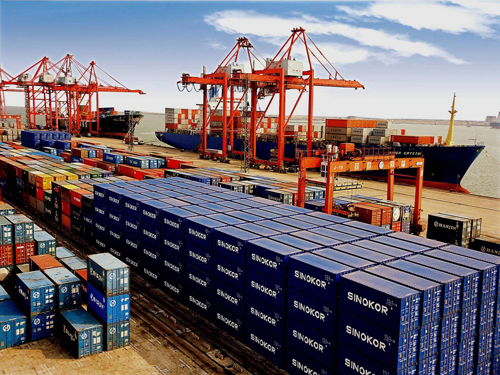China can chart its own course
- By John Ross
 0 Comment(s)
0 Comment(s) Print
Print E-mail China.org.cn, June 27, 2013
E-mail China.org.cn, June 27, 2013
Do recent share prices signal that the U.S. economy is on the road to recovery? What does the future hold for the Chinese and global economies? Guancha.cn recently discussed the implications of the latest economic data with John Ross, former director of Economic and Business Policy for London, a position equivalent to deputy mayor in China, and a specialist in international economic relations. He is now Senior Fellow of Chongyang Institute for Financial Studies, Renmin University of China.
|
|
|
The decrease in demand from overseas markets means that more stimulation of China's domestic economy is needed. [File photo] |
Guancha: Some analysts think that the U.S. economy is in recovery, in light of the fact that U.S. stock prices rallied to new highs recently. What is your opinion on this?
John Ross: The Dow Jones has climbed to a "record high" of 15,000 points, which seems like a sign of U.S. economic recovery. But it is a statistical gimmick to say that "America's share prices are at a record high" since inflation is not taken into account. Actually, if we factor in inflation, American share prices are 20 percent below where they were at their peak. If we wish to paint an accurate picture of the world economy, we must calculate the real value of U.S. share prices instead of merely buying into the figures bandied around by the media.
During the period since 2000, while the American stock market lost 20 percent of its real value, the Dow Jones-UBS Commodity Index (DJ-UBSCI) grew by 260 percent. Even if we subtract the depreciating U.S. Dollar Index, commodity prices over the same period have risen 188 percent. We would get a better return on our money from depositing our money in a Chinese bank for 13 years, as the "Chinese Aunts" usually do, than investing in the U.S. stock market!
Guancha: What impact will this have on China?
John Ross: An economic official, for instance a finance official, must not merely focus on the short-term, as this will inevitably result in failure.
My basic estimation is that the international economic environment will be quite tough in the following few years. China should, therefore, relinquish any expectations of external help. It should set a course for sustainable growth and place more emphasis on internal development. The economic policies which China adopted in the recent period unfortunately exaggerated the growth prospects of developed economies; this is why China failed to meet its 10 percent target for trade growth last year.
In economic policy China also needs to address its wide income distribution gap, which has been caused by development, and it should do so as soon as possible. It should also deal seriously with the financial crisis. This income distribution gap affects both different social layers as well as different regions. One of China's problems is that it has created many billionaires as a result of its economic development, with a too uneven distribution of wealth, and there are huge disparities among different provinces. So, reform cannot center simply on delegating power to lower levels, as this entails standing aside and doing nothing about reducing these levels of social inequality.
Guancha: What international economic data do you take most seriously when you assess both global and Chinese basic trends?
John Ross: The commodity price index and U.S. treasury yields - U.S. treasury yields show interest rates, the price of capital - and the industrial output and GDP figures. The former two are the first thing I read every day.
Guancha: What do you think of the soft power element of the China Model, in other words, building self-confidence through its own theory and development path?
John Ross: In my opinion, on economic fundamentals China does not need to learn from anyone - rather it is more important for other countries to learn from China. With three decades of world's highest economic growth, China should be a model for others, not vice versa. Development will always bring confidence, so China will gradually dictate its own course, unencumbered by external opinions.
China has also produced some of the world's finest economists, including Deng Xiaoping and Lin Yifu. In my view, Mr Deng is a much greater economist than Keynes, although I admire Keynes, and Mr Lin is better than any contemporary Western economist.







Go to Forum >>0 Comment(s)